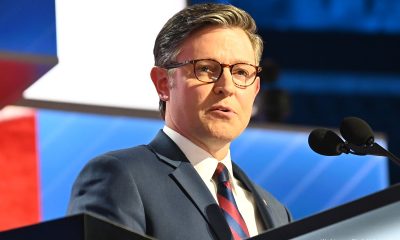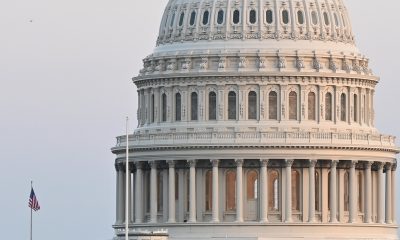National
Gay advocates assail Obama’s Justice Department
Claim administration misrepresented views in ‘Don’t Ask’ brief
Experts on “Don’t Ask, Don’t Tell” are lambasting the Justice Department, claiming the administration misrepresented their views in a legal brief aimed at thwarting a court challenge to the ban on open service.
Nathaniel Frank, a senior fellow at the Palm Center, a think tank at the University of California, Santa Barbara, said the Obama administration mischaracterized his views on the impact that open service would have on privacy issues.
“The way they portrayed me is preposterous and I’m not sure that any person in good faith hearing what I had to say could conclude what the [Department of Justice] concluded in their [request for] summary judgment,” he said. “I specifically said having a concern about privacy is not irrational, but using that privacy concern as an argument for the need to ban gays is irrational.”
Aaron Belkin, director of the Palm Center, similarly claimed the Justice Department misrepresented what he said in depositions about privacy arguments, and even went so far as to say the Obama administration lawyers weren’t being truthful.
“They completely misrepresented my statement in the deposition,” Belkin said. “They were not being truthful about my statement because they said that I claimed that there is a rational basis for the privacy arguments, and I claimed no such thing.”
In a request for summary judgment released earlier this week, the Justice Department names Frank and Belkin as among the experts on “Don’t Ask, Don’t Tell” who gave depositions in the case of Log Cabin v. United States. The lawsuit seeks to overturn the ban on the basis that it infringes upon the First Amendment rights of LGBT service members.
Both Frank and Belkin were questioned during deposition about whether privacy concerns for service members constituted a rational basis for the enactment of “Don’t Ask, Don’t Tell” in 1993.
The brief says Frank “acknowledged” during his deposition that “privacy concerns such as those on which Congress relied were not irrational.” But Frank disputed this characterization, pointing to his remarks during deposition.
According to an excerpt of the deposition obtained by DC Agenda, Frank was asked about privacy issues in the context of whether former Chairman of the Joint Chiefs of Staff Gen. Colin Powell’s statement in 1993 that service members “are required to live in communal settings that force intimacy and provide little privacy” was based on professional military judgment.
Frank replied that Powell — whose position has since evolved to endorse the Pentagon’s process for repealing the law — may have had concerns with privacy as a general matter based on professional judgment, but said Powell’s statement doesn’t “constitute an argument for keeping out open homosexuals.”
“Because what he says here is that service members are required to serve with very little privacy, so it doesn’t make any sense to me to conclude from that that there is a justification to exclude open homosexuals since he’s just acknowledged that part of being in the military means sacrificing privacy,” Frank said in his deposition.
It’s for this reason that Frank is now saying the Justice Department misrepresented his views in the brief against the lawsuit.
“So I really said the opposite of what the DOJ motion claims,” he said. “I made very clear that I would not call those feelings [about privacy] irrational, but nor would I call it rational to use that feeling as a legitimate basis for excluding a whole group of people. And that’s all there in the record.”
Belkin similarly cried foul, claiming the Justice Department mischaracterized his deposition in the brief. The administration says that Belkin testified that “the privacy basis is rational in circumstances such as combat where private accommodations are not possible.”
“Dr. Belkin studied the experience of the Israeli military and found that heterosexual concern about privacy necessitated, in certain instances, separate accommodations or work arrangements for heterosexual service members,” says the brief. “Dr. Belkin also acknowledged similar findings with respect to Congress’ concern regarding sexual tension within the military.”
According to the brief, Belkin also “pointedly admitted” people in the military have sex with each other, and some service members have “sex with other members of the same sex.”
But Belkin said the Justice Department’s account of his deposition and his alleged acknowledgement of a rational basis for privacy concerns was completely off the mark.
“People who defend ‘Don’t Ask, Don’t Tell’ for almost 20 years have been confusing up with down and left with right,” he said. “If the Obama administration lawyers think that my remarks in any way constitute an acknowledgement of the rational basis for the privacy rationale, then they need a new legal team.”
Belkin said the Justice Department neglected to mention major points about his deposition. He said he brought up men having sex with other men because he believes straight men would be having sex with men in the military regardless of the ban.
“Think for a minute about prisons,” he said. “It’s not exactly the same, but the point is not that gays are responsible for gay sex, but a lot of people have same-sex sex in the military and the privacy rationale does not take that into account. The privacy rationale is premised on the assumption that it’s only gays who having sex, so you have to get rid of the gays if you want to get rid of that kind of thing.”
Belkin also said the Justice Department misconstrued his take on there being a rational basis for “Don’t Ask, Don’t Tell” because some straight service members are uncomfortable around gay service members.
“It’s absolutely true that some heterosexual service members are uncomfortable in front of gay service members, but that in no way constitutes a rational basis for the privacy rationale because gays and lesbians are already serving with straight service members — and the conditions in the barracks and the showers are not going to change after the repeal of the ban,” he said.
The Justice Department didn’t respond to a request for comment on Frank and Belkin’s assertions that they were mischaracterized in the brief.
Frank also took issue with the Justice Department’s repeated references to experts on “Don’t Ask, Don’t Tell” with the use of quotation marks.
For example, the brief says in a footnote that “LCR’s ‘experts’ ultimately seek to challenge the wisdom of the DADT policy, a challenge that is irrelevant under rational basis review.”
Frank said the repeated reference to experts in quotation marks is “highly unusual” for the Justice Department and “may have gone too far.”
“That’s a favorite tactic of the religious right to polish their anti-intellectual credentials, and make it seem like there’s no such things as a homosexual, so they’ll put homosexual in quotes,” he said.
The Obama administration defense of the “Don’t Ask, Don’t Tell” statute against the challenge from Log Cabin is causing consternation among advocacy groups seeking to repeal the law.
Joe Solmonese, president of the Human Rights Campaign, said “we took a step backward” with the Justice Department brief in the move to repeal “Don’t Ask, Don’t Tell” and that the brief “relies on arguments that were debunked and discredited in 1993, and even more so now.”
Solmonese also called on the administration to “show leadership, move the debate forward, and work with Congress to get repeal done” this year.
“While the Pentagon undertakes its review of how to implement repeal, Congress can and must move forward in repealing DADT in the same bill that put it into law more than 17 years ago — the defense authorization act,” he said. “And the president can and must provide the leadership necessary to get the law passed this year.”
Aubrey Sarvis, executive director of the Servicemembers Legal Defense Network, expressed similar disappointment in a statement responding to the brief.
“SLDN understands the Justice Department’s role in defending the constitutionality of federal laws, even ones with which its leaders do not agree,” Sarvis said. “However, there continues to be a big and unnecessary disconnect between what DOJ files in court and what the president says on Capitol Hill and to his top [Department of Defense] leadership team.”
Sarvis said he wants the White House to make clear to Congress that “Don’t Ask, Don’t Tell” is a priority this year for President Obama and for the president to include repeal language in budget language headed to Capitol Hill in the coming weeks.
“The president’s defense budget repeal language should mirror the words in his State of the Union speech to Congress and the American people,” Sarvis said.
In a statement, Tracy Schmaler, spokesperson for the Justice Department, said the administration is defending “Don’t Ask, Don’t Tell” as “it traditionally does when acts of Congress are challenged.”
“The department does not pick and choose which federal laws it will defend based on any one administration’s policy preferences,” she said.
Schmaler said Obama disagrees with the underlying judgments Congress used to pass “Don’t Ask, Don’t Tell,” and noted that the president “believes and has repeatedly affirmed that [‘Don’t Ask, Don’t Tell’] is a bad policy that harms our national security and undermines our military effectiveness.”
“The president and his administration are working with the military leadership and Congress to repeal this discriminatory [law],” she said.
U.S. Federal Courts
Immigration judge dismisses Andry Hernández Romero’s asylum case
Gay makeup artist from Venezuela ‘forcibly removed’ to El Salvador in March

An immigration judge on Tuesday dismissed the asylum case of a gay makeup artist from Venezuela who the U.S. “forcibly removed” to El Salvador.
The Immigrant Defenders Law Center represents Andry Hernández Romero.
The Los Angeles-based organization in a press release notes Immigration Judge Paula Dixon in San Diego granted the Department of Homeland Security’s motion to dismiss Hernández’s case. A hearing had been scheduled to take place on Wednesday.
Hernández asked for asylum because of persecution he said he suffered in Venezuela because of his sexual orientation and political beliefs. NBC News reported Hernández pursued his case while at the Otay Mesa Detention Center in San Diego.
The Trump-Vance administration in March “forcibly removed” Hernández and other Venezuelans from the U.S. and sent them to El Salvador.
The White House on Feb. 20 designated Tren de Aragua, a Venezuelan gang, as an “international terrorist organization.”
President Donald Trump on March 15 invoked the Alien Enemies Act of 1798, which the Associated Press notes allows the U.S. to deport “noncitizens without any legal recourse.” Hernández is one of the lead plaintiffs in a lawsuit that seeks to force the U.S. to return those sent to El Salvador under the 18th century law.
The Immigrant Defenders Law Center says officials with U.S. Immigration and Customs Enforcement and U.S. Customs and Border Protection claimed Hernández is a Tren de Aragua member because of his tattoos. Hernández and hundreds of other Venezuelans who the Trump-Vance administration “forcibly removed” from the U.S. remain at El Salvador’s Terrorism Confinement Center, a maximum-security prison known by the Spanish acronym CECOT.
Homeland Security Secretary Kristi Noem earlier this month told gay U.S. Rep. Robert Garcia (D-Calif.) during a House Homeland Security Committee hearing that Hernández “is in El Salvador” and questions about his well-being “would be best made to the president and to the government of El Salvador.” Garcia, along with U.S. Reps. Maxwell Alejandro Frost (D-Fla.), Maxine Dexter (D-Ore.), and Yassamin Ansari (D-Ariz.), were unable to meet with Hernández last month when they traveled to the Central American country.
“DHS is doing everything it can to erase the fact that Andry came to the United States seeking asylum and he was denied due process as required by our Constitution,” said Immigrant Defenders Law Center President Lindsay Toczylowski on Thursday in the press release her organization released. “We should all be incredibly alarmed at what has happened in Andry’s case. The idea that the government can disappear you because of your tattoos, and never even give you a day in court, should send a chill down the spine of every American. If this can happen to Andry, it can happen to any one of us.”
Toczylowski said the Immigrant Defenders Law Center will appeal Dixon’s decision to the Board of Immigration Appeals, which the Justice Department oversees.
The Immigrant Defenders Law Center, the Human Rights Campaign, and other groups on June 6 plan to hold a rally for Hernández outside the U.S. Supreme Court. Protesters in Venezuela have also called for his release.
“Having tattoos does not make you a delinquent,” reads one of the banners that protesters held.
California
Calif. governor ‘encouraged’ by new state guidelines for trans student-athletes
Gavin Newsom responded to California Interscholastic Federation announcement

Governor Gavin Newsom is “encouraged” by a new policy announced Tuesday by the California Interscholastic Federation which critics say basically erases the concept that finishing first matters.
The CIF’s “pilot entry process” will give high school girls who lost to a transgender student-athlete at last weekend’s qualifying meet an invitation to compete at the state championship next weekend.
At the conclusion of the CIF Section’s Track and Field qualifying meets this past weekend, the CIF made the decision to pilot an entry process for the upcoming 2025 CIF State Track and Field Championships. Please see the following statement: pic.twitter.com/qOjWl6eybR
— CIF State (@CIFState) May 27, 2025
“CIF’s proposed pilot is a reasonable, respectful way to navigate a complex issue without compromising competitive fairness,” said Newsom spokesperson Izzy Gardon in a statement. “The governor is encouraged by this thoughtful approach.”
The change came hours after President Donald Trump threatened to pull “large scale federal funding” from the state if officials allowed trans athletes to compete according to their gender identity.
The CIF statement did not address Trump’s comments or whether the pilot entry process was in response to his social media post.
KCRA quoted a source as saying the policy had been in the works for weeks. The station also reported judges will score trans athletes separately from cisgender competitors, so there will ultimately be three winners: a cisgender male winner, a cisgender female winner, and a trans student-athlete winner.
“The CIF believes this pilot entry process achieves the participation opportunities we seek to afford our student-athletes,” the statement by CIF said.
CIF did not clarify if this pilot entry process will continue beyond this year’s championship, or how judges will determine whether an athlete is trans. A spokesperson for CIF did not immediately respond to these questions by the news media.
The trans athlete in question, AB Hernandez, 16, qualified to advance to the May 30-31 finals in Clovis, Calif., by winning regional competitions in long jump and triple jump on May 15. Now, she also will be competing against those same cisgender student-athletes she already beat.
In an interview with the California news outlet Capital & Main earlier this month, Hernandez refuted claims that she has an unfair advantage because she was presumed to be male at birth. She finished eighth in the high jump and third in the long jump at a recent meet.
“All I thought was, I don’t think you understand that this puts your idiotic claims to trash,” Hernandez told the paper. Of her critics, who booed so loudly at a recent meet they caused a false start at one event, Hernandez said, she said she pays them no mind.
“There’s nothing I can do about people’s actions, just focus on my own,” Hernandez told Capital & Main. “I’m still a child, you’re an adult, and for you to act like a child shows how you are as a person.”
The paper reported two of her most stringent opponents confronted the teen’s mother at a recent meet. “What a coward of a woman you are, allowing that,” said local superintendent candidate Sonja Shaw to Nereyda Hernandez. “How embarrassing!”
Shaw was at a meet with Jessica Tapia, an ex-gym teacher who was fired by Hernandez’s high school for refusing to respect trans and nonbinary students’ pronouns. They are part of the Save Girls Sports association that opposes inclusion of transgender female students in girls’ and women’s sports.
As of press time, Trump has not responded on social media to CIF’s announcement.
Podcaster and anti-trans inclusion activist Riley Gaines, a former college swimmer who tied for fifth place with a trans athlete in a 2022 national championship meet, denounced the CIF’s new policy, claiming “boys would still be competing against girls.”
This is not an adequate response from @CIFSS following Trump's threat to pull funds from CA. Boys would still be competing against girls.
They're fully admitting girls are being pushed out of their sports by boys. They just think the boys feelings matter more. pic.twitter.com/HQ5HD4QWZl
— Riley Gaines (@Riley_Gaines_) May 27, 2025
For his part, Newsom has already gone on the record against trans female athletes participating in girls’ and women’s sports, calling it an “issue of fairness.” That statement drew the ire of advocacy organizations, including Human Rights Campaign. Although Trump said he planned to speak to the governor, Newsom’s office did not say whether Newsom and the president had spoken.
As Politico reported, Republican lawmakers across California denounced the CIF’s new policy, some claiming it did not go far enough to “safeguard the interests of all female athletes.”
A spokesperson for the Jurupa Unified School District, where the trans student attends school, noted that the athlete is competing fairly and in accordance with the law.
“Both state law and CIF policy currently require that students be permitted to participate in athletic teams and competitions consistent with their gender identity, irrespective of the gender listed on the pupil’s records,” said spokesperson Jacquie Paul.
“We remain committed to following the law as written and ensuring that all students are granted the rights afforded to them in a safe and welcoming environment.”
Federal Government
So far, virtually no acknowledgement of Pride month by federal gov’t
Trump-Vance administration proclaimed ‘no more drag shows’ at Kennedy Center

Just a few days from the start of June, there has been virtually no acknowledgment of Pride month by federal government agencies this year, a striking departure from recent policy and practice under the Biden-Harris administration and even under President Donald Trump’s first term.
Some limited and more localized observances have been preserved or renewed in 2025, for example by the U.S. courts’ webpage celebrating history-making LGBTQ jurists like Judges Deborah A. Batts and J. Paul Oetken of the U.S. District Court for the Southern District of New York, and by the Metropolitan Washington Airports Authority, which notes on its website plans to actively participate in WorldPride 2025.
The paltriness of Pride this year comes pursuant to several policy changes under Trump 2.0 such as executive orders narrowing the definition of gender to exclude trans and nonbinary people and banning activities related to diversity, equity, and inclusion, which have led to agency-wide changes including the removal of LGBTQ focused website content and dissolution of “affinity groups.”
Many of these actions came to light in the first few months of Trump’s second term. For example, in January the Associated Press reported a memo from the U.S. Defense Intelligence Agency indicating that observances related to Martin Luther King Jr. Day, Pride Month, Holocaust Days of Remembrance, and other cultural or historical annual events would be paused.
While it remains to be seen whether and to what extent the White House, federal government, and Congress will acknowledge Pride month in 2025, in 2024:
- • At the end of May, President Joe Biden issued a proclamation declaring June LGBTQ Pride Month, as he had done for the previous three years of his administration
- • The U.S. Senate, then under Democratic control, introduced a resolution recognizing June 2024 as LGBTQ Pride Month
- • Federal agencies across the whole of government participated in Pride activities, and at a high level — for instance, then-U.S. Secretary of State Antony Blinken hosted a Pride month convening focused on U.S. foreign policy, national security, inclusive development, and human rights
- • Actions in June, which in many cases were coordinated via LGBTQ employee resource groups or affinity groups, included celebrations of LGBTQ individuals — for example, the U.S. Department of Commerce’s Economic Development Administration toasted those who made significant contributions to economic growth, while the U.S. Patent and Trademark Office hosted a “Proud Innovation 2024” event, highlighting the accomplishments of LGBTQ innovators, entrepreneurs, and small business owners who utilize intellectual property to grow their businesses and mentor others in their communities.
- Agencies also provided support indirectly — for example, the U.S. Federal Trade Commission sponsored attorneys who wished to represent the FTC at LGBTQ Pride events organized by various bar associations
The Washington Post pointed to some of the challenges facing organizers of WorldPride as they plan festivities in D.C. throughout early June: “This year, the LGBTQ+ celebration is being held in the backyard of a government that has targeted transgender rights and made major cuts to HIV prevention programs. At the Kennedy Center, President Donald Trump has promised “NO MORE DRAG SHOWS, OR OTHER ANTI-AMERICAN PROPAGANDA.”
On June 14, Trump is set to preside over a military parade in Washington commemorating the 250th anniversary of the U.S. Army, his 79th birthday, and Flag Day, in a celebration that will feature 6,600 soldiers from at least 11 corps and divisions nationwide and 150 military vehicles, including 28 M1 Abrams tanks.
-

 District of Columbia1 day ago
District of Columbia1 day agoWorldPride hotel bookings hint at disappointing turnout
-

 World Pride 20251 day ago
World Pride 20251 day agoKristine W on WorldPride, drag queens, and being ‘Love Personified’
-

 Movies4 days ago
Movies4 days agoGay director on revealing the authentic Pee-wee Herman
-

 Out & About4 days ago
Out & About4 days agoQueer film festival comes to D.C.













